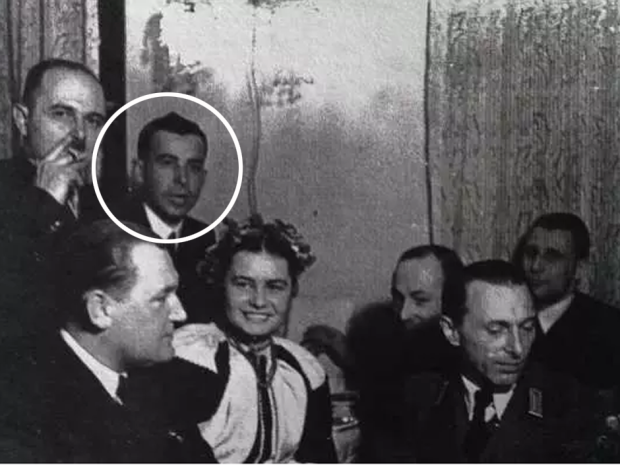Related Material
SS Galicia Division's Bloody Past
Formed in 1943 and made up mostly of ethnic Ukrainians, the Waffen-SS Galicia Division was a Wehrmacht-subordinated fighting formation recruited from among fascist radicals, and was responsible for the mass murder of anti-fascist and communist Ukrainians, Red Army troops, anti-fascist partisans, and Polish, Jewish, Russian and Slovak civilians.
Between 1943 and its surrender to the Western allies in May 1945, 14th SS Volunteer Division Galicia rampaged through Eastern Europe. It was used for "police actions" against Polish and Soviet partisans in western Ukraine and eastern Poland, deployed to wipe out hundreds of civilians at a time in the Polish settlements like Huta Pieniacka, Podkamien, Chodaczkowo Wielkie, Prehoryle, Smogligow and Borow, and thrown into meat grinders against the Red Army (where it took heavy losses approaching 75 percent during brutal fighting at Brody, Lvov region in July 1944).
The remnants of the division were evacuated and deployed in Slovakia in the late summer of 1944 to put down the Slovak National Uprising, and then sent to suppress partisan operations in Yugoslavia in January 1945. In March 1945, the formation retreated to Austria, taking heavy losses while trying to hold back Soviet forces in and around Graz during the desperate closing months of the war. Ukrainian fascist forces later incorporated into the division also took part in the suppression of the Warsaw Uprising between August and September of 1944, although the division itself did not take part.
|
A previous example of Canada's role in giving shelter to and
covering up the role of Nazi collaborators came to light in
2017, when independent media outlet Consortium News was attacked
by Canadian authorities after revealing that Chrystia Freeland,
the senior Trudeau cabinet member then serving as Canada's
Minister of Foreign Affairs, had attempted to cover up her
grandfather Mykhailo Khomiak's past as an editor of a Nazi
newspaper in occupied Poland during WWII, a newspaper that was
printed and published from facilities stolen from Krakow's
Polish-language Jewish newspaper Nowy Dziennik, no
less.
Canadian media later followed up on the allegations, confirming
the information, and revealing that Freeland not only knew of
her grandfather's dark past, but helped edit an academic article
in the Journal of Ukrainian Studies by her uncle,
John-Paul Himka, professor emeritus at the University of
Alberta, in a bid to whitewash the Nazi propagandist's
activities. When the news of her grandfather's true past leaked
out, the Canadian government immediately characterized it as a
"Russian disinformation" campaign aimed at "destabiliz[ing]
Western democracies," with Freeland claiming her grandparents
fled the war in 1939 as "political exiles with a responsibility
to keep alive the idea of an independent Ukraine."
After the escalation of the Ukrainian crisis in early 2022,
Freeland, now Deputy Prime Minister, got into more trouble after
tweeting (and after public outrage deleting) a photo of herself
holding a banner sporting the colors of the notorious fascist
militant formation known as the Ukrainian Insurgent Army
(Ukrainian acronym UPA), along with the UPA's slogan "Slava
Ukraini" (lit. "Glory to Ukraine").

|
Created in the 1930s as the paramilitary wing of the fascist
Organization of Ukrainian Nationalists (OUN), the UPA was
responsible for the killings of hundreds of hundreds of thousands civilians
in Nazi-occupied western Ukraine during World War II, among them
ethnic Poles, Jews, Russians, anti-fascist Ukrainians, and
later, as the Red Army advanced, Soviet soldiers.
The formations, some of whose volunteers ultimately ended up joining Waffen SS Galicia, remained active until well after the war's end. With the help of the U.S. Office of Strategic Services, precursor to the Central Intelligence Agency (CIA), militants waged a campaign of terror across western Ukraine until the early 1950s, killing some 25,000 Soviet troops, intelligence personnel and policemen, plus over 32,000 civilians, including many government administrators. Like SS Galicia vets, some UPA collaborators ended up in Canada and other Western countries after the war.
After World War II broke out, the Ukrainian Canadian Congress was formed to encourage Ukrainian Canadians to enlist in the Armed Forces to fight Hitler, with over 35,000 joining, constituting the second-largest group of non-British, non-French origin Canadian citizens to do so.
(With files from themaple.com, Consortium News, agencies.)
This article was published in

Volume 53 Number 8 - September 2023
Article Link:
https://cpcml.ca/Tmlm2023/Articles/MS53085.HTM
Website: www.cpcml.ca Email: editor@cpcml.ca



